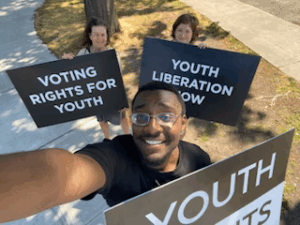Sometimes it’s difficult to remain optimistic about the future of youth rights, especially when lawmakers continue to pass laws to ‘protect the children’ and seem to set our goals back every day. I admit, I have problems staying optimistic about youth rights when I see new curfews being announced, or when parents’ groups try to ban a video game or an album because it will ‘corrupt our children’, or when politicians assert time after time that youth are not competent or intelligent enough to cast a vote for their desired politicians. However, history has continuously moved in the direction of progress and open-mindedness, and in the past three centuries, the tide of civil rights seems to be turning much more quickly.
Less than a century ago, women were granted the right to vote, the Civil Rights Acts were passed, the voting age was lowered to 18 and such racist organisations such as the Ku Klux Klan and the Knights of the White Camellia saw their powers sublimate. Nowadays we are seeing great leaps forward for queer rights and the rights of other oppressed groups in the United States. If progress is moving so quickly, why are we so despondent about youth rights? Before the dawn of the civil rights era in the twentieth century, it took hundreds of years for anyone besides older white males holding property to have power and rights.
Nowadays we see new civil rights advances happening year by year, even month by month. The question isn’t whether we will have youth rights; it is when we will achieve our goal of legal parity between the young and old. To achieve our goal, we must set our personal differences aside and co-operate to work towards the common goal of youth rights. We must remember that it is not about personal fame or recognition, or about getting one’s own back on elders who have slighted us before, but it is about the recognition as young people as human beings with equal value and dignity.
The problem is, so many of us get caught up in our own petty little disputes and get bogged down in abstruse arguments instead of working together. Sometimes all the little conflicts and disagreements distract us from our ultimate goal, so we allow ourselves to be taken up into a rapidly spinning centrifuge of confusion when we could be directing our feelings and arguments towards the more worthwile cause. We must not lose courage in ourselves, or lose sight of our goal when we work for the rights of the young. And through all the struggle, we must remind ourselves that history is continuously on the side of progress and justice, rather than cultural regressivism and social inequality. We must remain wise and cautious and proceed with the knowledge that we are working towards a freer and fairer world.






Beautiful.:)
Thanks. *bows*